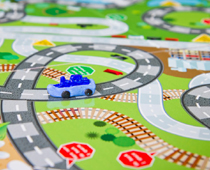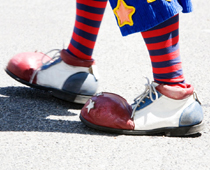|
1.
|
Without changing the meaning of the sentence, choose the best replacement for the word in italics.
The boys walked home because they were eager to try out their new game. 
|
|
| [ ] |
crept |
| [ ] |
raced |
| [ ] |
shuffled |
| [ ] |
wandered |
|
|
|
2.
|
Without changing the meaning of the sentence, choose the best replacement for the word in italics.
Lizzie said that she had a secret to tell us. 
|
|
| [ ] |
announced |
| [ ] |
told |
| [ ] |
smiled |
| [ ] |
questioned |
|
|
|
3.
|
Without changing the meaning of the sentence, choose the best replacement for the word in italics.
The family left the rubbish from their picnic. 
|
|
| [ ] |
spilled |
| [ ] |
quit |
| [ ] |
stopped |
| [ ] |
abandoned |
|
|
|
4.
|
Without changing the meaning of the sentence, choose the best replacement for the word in italics.
Tom was happy to be offered such an important role in the school play. 
|
|
| [ ] |
overjoyed |
| [ ] |
delighted |
| [ ] |
glad |
| [ ] |
All of the above |
|
|
|
5.
|
Without changing the meaning of the sentence, choose the best replacement for the word in italics.
The children were tired after climbing the mountain. 
|
|
| [ ] |
bored |
| [ ] |
weary |
| [ ] |
irritated |
| [ ] |
worried |
|
|
|
6.
|
Without changing the meaning of the sentence, choose the best replacement for the word in italics.
The girls were sad when their cat went missing. 
|
|
| [ ] |
humiliated |
| [ ] |
dreadful |
| [ ] |
downhearted |
| [ ] |
furious |
|
|
|
7.
|
Without changing the meaning of the sentence, choose the best replacement for the word in italics.
The class liked those hot, sunny days when they were allowed to play cricket all afternoon. 
|
|
| [ ] |
enjoyed |
| [ ] |
admired |
| [ ] |
agreed |
| [ ] |
gained |
|
|
|
8.
|
Without changing the meaning of the sentence, choose the best replacement for the word in italics.
The sun's hot rays shone all afternoon. 
|
|
| [ ] |
glistened |
| [ ] |
lit |
| [ ] |
glowed |
| [ ] |
blazed |
|
|
|
9.
|
Without changing the meaning of the sentence, choose the best replacement for the word in italics.
The clown's tricks made the children roll around, laughing, while the adults couldn't help but laugh. 
|
|
| [ ] |
smiling, roar |
| [ ] |
giggling, chuckle |
| [ ] |
crying, shriek |
| [ ] |
happy, smirk |
|
|
|
10.
|
Without changing the meaning of the sentence, choose the best replacement for the word in italics.
The dog's loud barking just made the baby cry even more loudly. 
|
|
| [ ] |
snivel |
| [ ] |
simper |
| [ ] |
howl |
| [ ] |
snuffle |
|
|



